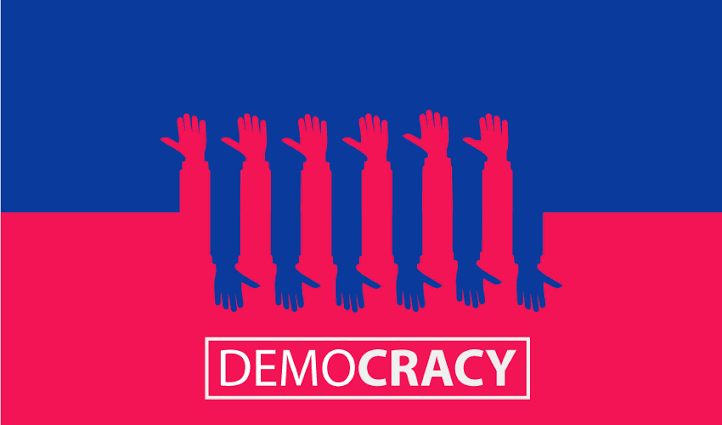Top 10 Reasons Why Democracy Is The Best Form Of Government

A nation is nothing more than a large community that, like any other, needs to be governed. People have had governments for at least 5,000 years. It's profoundly implanted in our general public and plagues our day to day routines. You might have occasionally read about a new bill, an updated policy, or other government-related conversations on social media or in publications. But what do you think of when you hear the word government? Do words like politics, president, power, or even rules come to mind? It is essential to keep in mind that understanding any government system begins with defining government.
What is Government
Government can be defined as the system or organization that has the authority and power to make and enforce laws, regulations, policies, and decisions for a particular territory or country. It is the means by which a society organizes itself and maintains order, justice, and security.
The government consists of three branches: the legislative branch, the executive branch, and the judicial branch. The legislative branch is responsible for making laws, the executive branch is responsible for enforcing laws, and the judicial branch is responsible for interpreting laws and resolving disputes.
In addition to these branches, the government also includes various agencies, departments, and bureaus that perform specific functions, such as providing public services, collecting taxes, regulating industries, and conducting foreign affairs.
Governments can take many forms, ranging from democracies, where power is vested in the people through elections and representatives, to dictatorships, where power is concentrated in the hands of a single leader or group. Governments can also be classified based on their level of centralization, with some being highly centralized, such as unitary states, and others being more decentralized, such as federal states.
READ ALSO » Why Do We Need To Support Mustapha Ope Saraki?
Man is, by nature, a political animal, as Aristotle once stated. He builds and lives in a society with his peers, and he wants to control and be ruled at the same time. This can be seen in the various approaches taken to government systems over time.
They are typically led by a single individual (autocracy, absolute monarchy), led by a small group (oligarchy, aristocracy, plutocracy, etc.), or Democracy is the most prevalent form of government in use today in the majority of nations, and government by the majority (democracy). In fact, it has proven to be the best in theory and practice in a number of nations worldwide.
As a result, the question is: What exactly makes democracy superior to other forms of government?
The unique features of democracy that the majority of people, regardless of their fundamental political beliefs, find advantageous are the subject of this article. The motivation behind this article is to feature ten justifications for why a vote based system is the best type of government. Let's get started, then.
Why Democracy Is Said to Be the Best Form of Government? The word democracy is derived from two Greek words: demos” (people) and kratia (government or rule) People's government literally translates to democracy. According to Abraham Lincoln, government of the people, by the people, and for the people
A majority rules system is a type of government wherein people of a nation practice power through elected officials, direct voting, or a combination of the two in most circumstances
Winston Churchill famously stated, Democracy is the worst form of government other than all those other systems that have been tried from time to time. A vote based system has over and over showed that it is the best type of government, in spite of its imperfections. In many Western nations, democracy is the foundation of human liberty and economic prosperity. This method of governance is utilized by the majority of prosperous nations worldwide, including Germany, the United Kingdom, and the United States of America. The failures of its adversarial systems, particularly autocracy and tyranny, in various parts of the world, in addition to its successes in many countries, bolster the desire for democracy.
Below are the top 10 reasons that support the notion that Democracy is the best form of government
- Decentralization of power
- It Promotes Equality
- People's rights and interests are safeguarded
- It Establishes Legitimacy
- It fosters a Sound Decision-Making Process
- It Reduces conflict and Wars
- High Level of Freedom
- It Increases Civic Engagement Since It Gives people a chance to become personally involved with their Government
- It ensures smooth transition of Power
- It is a flexible System of Government
1. Decentralization of power
In the past, it has been disastrous to put too much power in the hands of a single person. There is no central authority that can control what the people can and cannot do in a democracy. The vote of the people is what makes any decision, and the people hold the power. The people are able to hold their government accountable and prevent abuse of power in this manner.
2. It Promote Equality
READ ALSO » Dino Melaye Explains Why He Lost PDP Senatorial Primary In Kogi
One of the fundamental tenets of democracy is that everyone has the right to vote and is equal before the law. During an election, the framework of democracy gives each vote the same weight.
A person, regardless of their social or financial status, has the right to vote and express an opinion when they register for this process. They can do so without being scrutinized. Whether you are wealthy or poor, own land or not, or express your gender in a particular manner, any yes or no counts as one.
3. People's rights and interests are safeguarded
When individuals hold positions of power, any and all government structures are susceptible to manipulation. Examples of mass brutality, extrajudicial executions, and other forms of injustice are common in authoritarian regimes. However, since the majority of citizens in a democracy hold power, such news is rarely reported.
It is impossible for elected politicians to ignore the needs of the general public in a democracy. They are pushed to represent the needs of each community in order to ensure that everyone has an equal chance of achieving their objectives. As a result, the rights and interests of the people are protected and supported in a way that is acceptable and in accordance with the laws that govern the land.
4. It Establishes legitimacy
Democracy produces a political structure that is suitable for each individual because voters choose who will be in charge and how policies are made. Because he comes to power through popular vote and in accordance with legal requirements, a democratic government is genuine, authentic, and laudable.
This is crucial because it gives citizens a sense of responsibility and belonging, as well as the self-assurance to oppose bad government decisions objectively through recalls and protests.
5. It fosters a Sound Decision-Making Process
The decision-making process is thoroughly vetted and scrutinized in a democracy. For instance, before a bill can become a law, it must first be approved by the executive branch and go through extensive public hearings and debate in the legislature.
The courts have the authority to declare a statute null and void and of no effect even if it becomes law but is later found to be illegal due to procedural errors.
6. It Reduces conflict and Wars
READ ALSO » Ex-Education Minister, Nwajiuba, claims farmer gave him yams to sell to buy 2023 presidential form
The most statistically significant factor in reducing conflict between and within states is democracy. This is probably because democracies are compelled to avoid war at all costs because it is politically unpopular because it costs lives.
Nationwide conflicts are more uncertain in majority rules systems on the grounds that popularity based states go about as a wellbeing valve for disappointed residents; Citizens in autocracies, on the other hand, are forced to resort to violence in order to achieve governmental change because they lack political power, whereas citizens in democracies can express their dissatisfaction through free speech, voting and peaceful protest.
7. High Level of Freedom
In a democratic society, there is a lot of freedom for each person. In most democracies, people are free to do whatever they want as long as they don't hurt other people or break the law. People can therefore freely express themselves through speech, cultural or religious beliefs, and so forth.
On the other hand, freedom is severely restricted in dictatorships because tyrants frequently oppose individual liberty out of fear of revolt if citizens become excessively informed about what is going on in their country. The common people have the opportunity to pursue any desired outcome thanks to democratic structures. As a result, stability and growth are all encouraged.
8. It Increases Civic Engagement Since It Gives people a chance to become personally involved with their Government
Because the people and their voices control the government in a democracy, everyone has a says in what happens to them. Voting according to one's moral convictions is an individual right. Each voting form is an opportunity to offer one's novel point of view and uproot bad government. In a democracy, regardless of whether that voice is heard by the majority, the vote matters unless there is a strong moral objection to the outcome.
9. It ensures smooth transition of Power
The transition from one political leader to the next is typically relatively smooth and trouble-free in democratic nations. Maintaining a nation's political and social stability is made possible by this.
On the other hand, other political regimes frequently use revolutions to assassinate or remove political leaders, leaving a void of political authority and significant levels of instability in the nation in question.
10. It is a flexible System of Government
Democracy can take many different forms and is a dynamic process that develops and changes over time. Democracy's ability to change over time is its strength. In light of its adaptable nature, it helps the public authority in adjusting to evolving perspectives.
